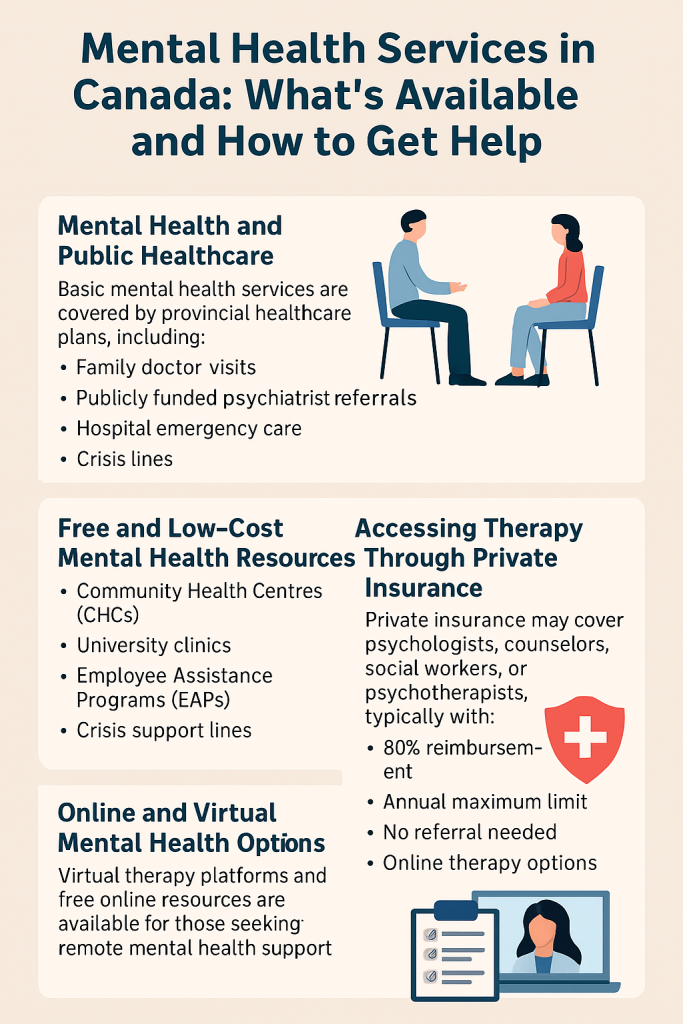Mental health is just as important as physical health—but getting the support you need can feel overwhelming, especially when you’re not sure where to begin. The good news? Canada offers a variety of public and private mental health services, and knowing what’s available can help you take that crucial first step toward feeling better.
Whether you’re dealing with stress, anxiety, depression, or more complex needs, here’s how mental health care works in Canada—and how to find the right support.
Mental Health and Public Healthcare: What’s Covered
Most provinces and territories include basic mental health services in their public healthcare plans. That means:
- Visits to your family doctor for mental health concerns
- Referrals to publicly funded psychiatrists
- Emergency mental health care in hospitals
- Crisis lines and some short-term counseling (in select areas)
However, the system can be limited. Wait times for publicly funded therapy can be long, and psychologists and counselors in private practice are not usually covered under provincial health insurance.
Free and Low-Cost Mental Health Resources
Don’t let cost stop you from getting help. Here are some no- or low-cost options available across Canada:
Community Health Centres (CHCs)
- Mental health assessments
- Counseling
- Support for addiction, trauma, or family violence
They prioritize vulnerable and underserved populations, and services are often free.
University Clinics
If you’re a student, most colleges and universities provide free on-campus counseling and mental health support. Staff and faculty may also have access through workplace benefits.
Employee Assistance Programs (EAPs)
Many workplaces offer short-term counseling and referrals through EAPs. It’s confidential and usually free of charge.
Crisis Support Lines
Available 24/7, these services provide immediate help:
- Talk Suicide Canada: 1-833-456-4566
- Kids Help Phone: 1-800-668-6868 or text 686868
- Provincial mental health lines (e.g., 811 in BC and Quebec)
Accessing Therapy Through Private Insurance
If you have private health insurance (either through work or personal plans), you may have coverage for:
- Psychologists
- Clinical counselors
- Social workers
- Psychotherapists
Typical coverage includes:
- 80% of the fee up to a certain annual maximum
- No doctor referral needed
- Online therapy often included
Tip: Ask your insurer for a list of approved providers and check how many sessions are covered per year.
Online and Virtual Mental Health Options
Canada has seen rapid growth in digital mental health tools. Some examples include:
- Wellness Together Canada (funded by the federal government): Free online resources, text-based counseling, and self-guided programs
- MindBeacon, Inkblot, BetterHelp: Low-cost virtual therapy platforms, some of which may be insurance-eligible
Virtual care is ideal if you’re in a rural area, have mobility challenges, or prefer more privacy.
Specialized Support for Newcomers, Youth, and Indigenous Peoples
- Newcomers: Immigrant-serving agencies often provide multilingual counseling and culturally sensitive care.
- Youth: Programs like Foundry BC and Jack.org offer youth-centered mental health services.
- Indigenous Peoples: Access to NIHB (Non-Insured Health Benefits), as well as community-led trauma and wellness programs.
Final Thoughts: You’re Not Alone, and Help Is Available
Mental health care in Canada is evolving, with growing options for accessible, affordable support. Whether you prefer in-person therapy, community programs, or digital tools, the key is to start—reach out, ask questions, and find the path that works best for you.
Because everyone deserves to feel well, mentally and emotionally.



